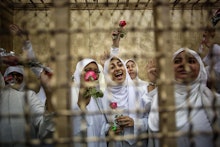You've Heard of the Brotherhood, But Now the Muslim Sisterhood is Taking Egypt By Storm

After spending weeks locked in a prison cell, 18-year-old Ola Ezzat is ready to take to the streets in protest — which is what landed her in prison in the first place
"This is our right, and we cannot only exercise it the first time," Ezzat told Al Jazeera.
Ezzat is one of 21 women who were arrested in Alexandria, Egypt in October during a peaceful protest. This group of women was sentenced to 11 years in prison (although their sentences have now been reduced) due to their demonstration on behalf of former President Mohammed Morsi, who was removed from power in July by the Egyptian military. Morsi is a member of the Muslim Brotherhood, an Islamist political party that has been a prominent player in Egyptian politics and society for decades.
The future of the Muslim Brotherhood, as well as Egypt as a whole, will in part be determined by the constitutional referendum that was held on Wednesday.
"Both opponents and supporters [of changing the constitution] are pitching the referendum as not a vote on a constitutional document, but on Egypt's new administration and the current road-map," according to Foreign Policy.
Despite the fact that the Egyptian government is cracking down on activities led by the Muslim Brotherhood, the group continues to appeal to some Egyptian women who believe the Brotherhood represents their interests better than anyone else, which is why many of the recently released 21 women plan to continue their involvement in this "Muslim Sisterhood."
"I want to raise my voice as loud as possible and chant against oppression," 20-year old Gehad Mowafi told the Daily Beast after her release from prison.
"Of course, I'm going to continue protesting," said 15-year old Yomna Abu Eissa in the same report. "It's a shame all the people who are being killed, all the arrests that are happening, and now I have been oppressed."
So why does the Muslim Brotherhood, a group that is socially conservative, appeal to women, many of them young and educated?
The answer to this question lies in the role the Muslim Brotherhood has played for over 50 years as a provider of services to the lower classes of Egyptian society. It also requires the understanding that gender politics in Egypt cannot be discussed in terms of liberal secularists versus conservative Islamists. The Islamist Muslim Brotherhood has for decades provided women with far more opportunities for civic participation and economic security than the secular government did.
During the 30 years Egypt was ruled by secular dictator Hosni Mubarak, the Brotherhood gave women a viable alternative to the oppressive regime which excluded women from almost all important positions in society. The Brotherhood also primarily functioned as a charitable organization, and the economic and social programs the group created appealed to many Egyptian women.
The Muslim Brotherhood has for a long time been the most reliable source of social services for the needy, a crucial issue for women with families. As of just a few years ago, the group ran over 20 hospitals in the country, operated schools in all 27 governorates of Egypt and ran 20% of the country's NGOs, according to UN data. It also operated centers for widows and orphans and provided job training for unemployed people. Not only did the Brotherhood make these services available, but it also offered them as a higher-quality alternative to public services and a cheaper alternative to private services.
Additionally, women were often at the helm of these charities and schools, providing them with opportunities for involvement in the socio-political sphere that were not previously possible in the sectors of society controlled by Mubarak.
According to Newsweek, "Critics say the women are playing a superficial role in the brotherhood and they are still not its main decision-makers," a fact which is obviously troublesome. But for some women the possibilities as part of the organization far exceeded what they could have had outside of it.
Azza el-Gharf, a prominent member of the Muslim Brotherhood. Image Credit: AP
When the Egyptian military ousted President Morsi and the rest of the Muslim Brotherhood government in July, the United States implicitly supported this move. At the heart of this position is the assumption that a secular government is better than an Islamist government, especially when it comes to issues such as women's rights.
This may be true to an extent, but it is important to recognize Egyptian women for what they are: not passive victims of an oppressive regime, but dynamic players in the political sphere who are motivated by economic concerns and the desire for greater freedom.
Neither Mubarak's secular dictatorship nor Morsi's Islamist government fully supported women in these aims, but one can understand why some Egyptian women may think that their future would be brighter with the group that has taken care of their families and given them real opportunities for involvement and advancement.